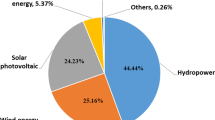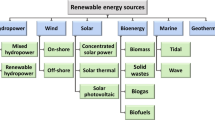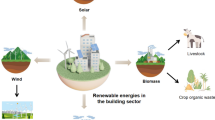Abstract
With the goal of becoming a regional leader in clean energy, Morocco has invested heavily in renewable energy mega-projects over the last decade, including the Noor-Ouarzazate complex, the largest concentrated solar power (CSP) plant in the world. To continue accelerating its energy transition and achieve renewable energy targets by 2030, Morocco should focus on small-, medium-, and large-scale projects. However, choosing the most sustainable renewable energy technology (RET) is a complex decision-making problem. This study proposes a novel hybrid multi-criteria decision-making framework for the sustainability assessment of RETs in Morocco. By evaluating the existing RETs (wind, CSP, solar PV, hydro, and biomass) in terms of environmental, economic, technical, and social criteria, the study aims to assist decision-makers in selecting the most sustainable option. The cardinal (CAR) method was used to elicit criteria weights, with economic (30.7% of weight) and environmental (29% of weight) criteria being prioritized. The PROMETHEE method was then used to rank the alternatives, with solar PV emerging as the most sustainable technology, followed by wind, hydro, CPS, and lastly biomass. It should be noted that the PROMETHEE I partial ranking indicated that wind and hydro were both ranked second in terms of sustainability, highlighting the need for careful consideration when choosing between these two options. The study also found that the rankings were similar using both linear and Gaussian preference functions with different thresholds.








Similar content being viewed by others
References
Abdel-Basset M, Gamal A, Chakrabortty RK, Ryan MJ (2021) Evaluation approach for sustainable renewable energy systems under uncertain environment: a case study. Renew Energy 168:1073–1095
Ahmad S, Nadeem A, Akhanova G, Houghton T, Muhammad-Sukki F (2017) Multi-criteria evaluation of renewable and nuclear resources for electricity generation in Kazakhstan. Energy 141:1880–1891
Ahmad S, Tahar RM (2014) Selection of renewable energy sources for sustainable development of electricity generation system using analytic hierarchy process: a case of Malaysia. Renew Energy 63:458–466
Al Garni H, Kassem A, Awasthi A, Komljenovic D, Al-Haddad K (2016) A multicriteria decision making approach for evaluating renewable power generation sources in Saudi Arabia. Sustain Energy Technol Assess 16:137–150
Ali T, Nahian AJ, Ma H (2020) A hybrid multi-criteria decision-making approach to solve renewable energy technology selection problem for rohingya refugees in Bangladesh. J Clean Prod 273:122967
Angilella S, Pappalardo MR (2021) Assessment of a failure prediction model in the european energy sector: a multicriteria discrimination approach with a PROMETHEE based classification. Expert Syst Appl 184:115513
Balsalobre-Lorente D, Shahbaz M, Roubaud D, Farhani S (2018) How economic growth, renewable electricity and natural resources contribute to CO2 emissions? Energy Policy 113:356–367
Behzadian M, Kazemzadeh RB, Albadvi A, Aghdasi M (2010) PROMETHEE: a comprehensive literature review on methodologies and applications. Eur J Oper Res 200(1):198–215
Benazzouz A, Mabchour H, El Had K, Zourarah B, Mordane S (2020) Offshore wind energy resource in the Kingdom of Morocco: Assessment of the seasonal potential variability based on satellite data. J Mar Sci Eng 9(1):31
Bezerra PRS, Schramm F, Schramm VB (2021) A multicriteria model, based on the PROMETHEE II, for assessing corporate sustainability. Clean Technol Environ Policy 23(10):2927–2940
Brans JP, Mareschal B (2005) Promethee methods. In: Figueira J, Greco S, Ehrgott M (eds) Multiple criteria decision analysis: state of the art surveys. Springer International Publishing, New York, pp 163–196
Bohra SS, Anvari-Moghaddam A (2022) A comprehensive review on applications of multicriteria decision‐making methods in power and energy systems. Int J Energ Res 46(4):4088–4118
Büyüközkan G, Güleryüz S (2017) Evaluation of renewable Energy Resources in Turkey using an integrated MCDM approach with linguistic interval fuzzy preference relations. Energy 123:149–163
Büyüközkan G, Karabulut Y, Mukul E (2018) A novel renewable energy selection model for United Nations’ sustainable development goals. Energy 165:290–302
Chen T, Wang YT, Wang JQ, Li L, Cheng PF (2020) Multistage decision framework for the selection of renewable energy sources based on prospect theory and PROMETHEE. Int J Fuzzy Syst 22(5):1535–1551
Corrente S, Greco S, Leonardi F, Słowiński R (2021) The hierarchical SMAA-PROMETHEE method applied to assess the sustainability of european cities. Appl Intell 51(9):6430–6448
da Cunha RA, Rangel LAD, Rudolf CA, dos Santos L (2022) A decision support approach employing the PROMETHEE method and risk factors for critical supply assessment in large-scale projects. Oper Res Perspect 100238
Dadrasajirlou Y, Karami H, Mirjalili S (2023) Using AHP-PROMOTHEE for selection of best Low-Impact Development designs for urban flood mitigation. Water Resour Manag 37:375–402
Danielson M, Ekenberg L (2016) The CAR method for using preference strength in multi-criteria decision making. Group Decis Negot 25(4):775–797
Dovichi Filho FB, Santiago YC, Lora EES, Palacio JCE, del Olmo OAA (2021) Evaluation of the maturity level of biomass electricity generation technologies using the technology readiness level criteria. J Clean Prod 295:126426
García I, Leidreiter A (2016) A roadmap for 100% renewable energy in Morocco. World Future Council. https://www.worldfuturecouncil.org. Accessed 30 Aug 2022
Ghandi M, Roozbahani A (2020) Risk management of drinking water supply in critical conditions using fuzzy PROMETHEE V technique. Water Resour Manag 34(2):595–615
Haddad B, Liazid A, Ferreira P (2017) A multi-criteria approach to rank renewables for the algerian electricity system. Renew Energy 107:462–472
Karakaş E, Yıldıran OV (2019) Evaluation of renewable energy alternatives for Turkey via modified fuzzy AHP. Int J Energy Econ Policy 9(2):31–39
Kaushika ND, Mishra A, Rai AK (2018) Solar photovoltaics: technology, system design, reliability and viability. Springer, Berlin
Kousksou T, Allouhi A, Belattar M, Jamil A, El Rhafiki T, Arid A, Zeraouli Y (2015) Renewable energy potential and national policy directions for sustainable development in Morocco. Renew Sustain Energy Rev 47:46–57
Li P, Xu Z, Wei C, Bai Q, Liu J (2022) A novel PROMETHEE method based on GRA-DEMATEL for PLTSs and its application in selecting renewable energies. Inf Sci 589:142–161
Li T, Li A, Guo X (2020) The sustainable development-oriented development and utilization of renewable energy industry—a comprehensive analysis of MCDM methods. Energy 212:118694
Makan A, Fadili A (2020) Sustainability assessment of large-scale composting technologies using PROMETHEE method. J Clean Prod 261:121244
Makan A, Fadili A (2021) Sustainability assessment of healthcare waste treatment systems using surrogate weights and PROMETHEE method. Waste Manag Res 39(1):73–82
Makan A, Gouraizim M, Fadili A (2022) Sustainability assessment of wastewater treatment systems using cardinal weights and PROMETHEE method: case study of Morocco. Environ Sci Pollut Res 29(13):19803–19815
Mareschal B (2022) PROMETHEE-GAIA Statistics. http://www.promethee-gaia.net/assets/promethee-stats.pdf. Accessed 14 Jun 2022
MASEN, Moroccan Agency for Sustainable Energy (2022) http://www.masen.ma. Accessed 7 Feb 2022
MEME, Ministry of Energy, Mining, and the Environment, Morocco (2021) Feuille de Route Nationale pour la ValorisationEnergétique de la Biomasse - HORIZON 2030
MEME (2022) Ministry of Energy, Mining, and the Environment, Morocco https://www.mem.gov.ma/en. Accessed 7 Feb 2022
Miszczyńska K (2020) Improving managerial decisions in health care sector: application of Promethee II method in public hospitals. Oper Res Decision 30(4):65–79
Mohammadi Seif Abad P, Pazira E, Masih Abadi MH, Abdinezhad P (2021) Application AHP-PROMETHEE technic for landfill site selection on based assessment of aquifers vulnerability to pollution. Iran J Sci Technol Trans Civ Eng 45:1011–1030
Neofytou H, Nikas A, Doukas H (2020) Sustainable energy transition readiness: a multicriteria assessment index. Renew Sust Energ Rev 131:109988
Oberschmidt J, Geldermann J, Ludwig J, Schmehl M (2010) Modified PROMETHEE approach for assessing energy technologies. Int J Energy Sector Manag 4(2):183–212
Ostovare M, Shahraki MR (2019) Evaluation of hotel websites using the multicriteria analysis of PROMETHEE and GAIA: evidence from the five-star hotels of Mashhad. Tour Manag Perspect 30:107–116
Özkale C, Celik C, Turkmen AC, Cakmaz ES (2017) Decision analysis application intended for selection of a power plant running on renewable energy sources. Renew Sustain Energy Rev 70:1011–1021
Perner J, Bothe D (2018) International aspects of a Power-to-X roadmap. A report prepared for the World Energy Council Germany. Berlin
Phillis A, Grigoroudis E, Kouikoglou VS (2021) Assessing national energy sustainability using multiple criteria decision analysis. Int J Sustain Dev World Ecol 28(1):18–35
Purvis B, Mao Y, Robinson D (2019) Three pillars of sustainability: in search of conceptual origins. Sustain Sci 14(3):681–695
Rahman MM (2020) Environmental degradation: the role of electricity consumption, economic growth and globalisation. J Environ Manag 253:109742
Rutovitz J, Atherton A (2009) Energy sector jobs to 2030: a global analysis. Prepared for Greenpeace International by the Institute for Sustainable Futures. University of Technology, Sydney
Saleem L, Ulfat I (2019) A multi criteria approach to rank renewable energy technologies for domestic sector electricity demand of Pakistan. Mehran Univ Res J Eng Technol 38(2):443–452
Saraswat SK, Digalwar AK (2021) Evaluation of energy alternatives for sustainable development of energy sector in India: an integrated Shannon’s entropy fuzzy multi-criteria decision approach. Renew Energy 171:58–74
Şengül Ü, Eren M, Shiraz SE, Gezder V, Şengül AB (2015) Fuzzy TOPSIS method for ranking renewable energy supply systems in Turkey. Renew Energy 75:617–625
Sitorus F, Brito-Parada PR (2020) A multiple criteria decision making method to weight the sustainability criteria of renewable energy technologies under uncertainty. Renew Sustain Energy Rev 127:109891
Sotiropoulou KF, Vavatsikos AP (2021) Onshore wind farms GIS-Assisted suitability analysis using PROMETHEE II. Energy Policy 158:112531
Stanković JJ, Janković-Milić V, Marjanović I, Janjić J (2021) An integrated approach of PCA and PROMETHEE in spatial assessment of circular economy indicators. Waste Manag 128:154–166
Tasri A, Susilawati A (2014) Selection among renewable energy alternatives based on a fuzzy analytic hierarchy process in Indonesia. Sustain Energy Technol Assess 7:34–44
Troldborg M, Heslop S, Hough RL (2014) Assessing the sustainability of renewable energy technologies using multi-criteria analysis: suitability of approach for national-scale assessments and associated uncertainties. Renew Sustain Energ Rev 39:1173–1184
Tong LZ, Wang J, Pu Z (2022) Sustainable supplier selection for SMEs based on an extended PROMETHEE II approach. J Clean Prod 330:129830
Villanthenkodath MA, Mahalik MK (2021) Does economic growth respond to electricity consumption asymmetrically in Bangladesh? The implication for environmental sustainability. Energy 233:121142
Vujanović M, Wang Q, Mohsen M, Duić N, Yan J (2019) Sustainable energy technologies and environmental impacts of energy systems. Appl Energy 256:113919
Wang Y, Xu L, Solangi YA (2020) Strategic renewable energy resources selection for Pakistan: based on SWOT-Fuzzy AHP approach. Sustain Cities Soc 52:101861
Wati M, Cahyono B, Firdaus MB (2018) Evaluation of poverty society for social assistance recipients using PROMETHEE method based on Entropy weight. In 2nd East Indonesia Conference on Computer and Information Technology (EIConCIT) (pp 197–202). IEEE
WEF, World Energy Forum (2020) Energy Transition 101: Getting back to basics for transitioning to a low-carbon economy. https://www3.weforum.org. Accessed 30 Aug 2022
Wu Y, Xu C, Zhang T (2018) Evaluation of renewable power sources using a fuzzy MCDM based on cumulative prospect theory: a case in China. Energy 147:1227–1239
Wu Y, Zhang B, Wu C, Zhang T, Liu F (2019) Optimal site selection for parabolic trough concentrating solar power plant using extended PROMETHEE method: a case in China. Renew Energy 143:1910–1927
Yazdani M, Chatterjee P, Zavadskas EK, Streimikiene D (2018) A novel integrated decision-making approach for the evaluation and selection of renewable energy technologies. Clean Technol Environ Policy 20(2):403–420
Yürek YT, Bulut M, Özyörük B, Özcan E (2021) Evaluation of the hybrid renewable energy sources using sustainability index under uncertainty. Sustain Energy Grids Netwo 28:100527
Author information
Authors and Affiliations
Corresponding author
Ethics declarations
Conflicts of interest
The authors have no relevant financial or non-financial interests to disclose. All authors certify that they have no affiliations with or involvement in any organization or entity with any financial interest or non-financial interest in the subject matter or materials discussed in this manuscript. The authors have no financial or proprietary interests in any material discussed in this article.
Competing interests
The authors have no competing interests to declare that are relevant to the content of this article.
Additional information
Publisher’s Note
Springer Nature remains neutral with regard to jurisdictional claims in published maps and institutional affiliations.
Rights and permissions
Springer Nature or its licensor (e.g. a society or other partner) holds exclusive rights to this article under a publishing agreement with the author(s) or other rightsholder(s); author self-archiving of the accepted manuscript version of this article is solely governed by the terms of such publishing agreement and applicable law.
About this article
Cite this article
Gouraizim, M., Makan, A. & El Ouarghi, H. A CAR-PROMETHEE-based multi-criteria decision-making framework for sustainability assessment of renewable energy technologies in Morocco. Oper Manag Res 16, 1343–1358 (2023). https://doi.org/10.1007/s12063-023-00361-4
Received:
Revised:
Accepted:
Published:
Issue Date:
DOI: https://doi.org/10.1007/s12063-023-00361-4




